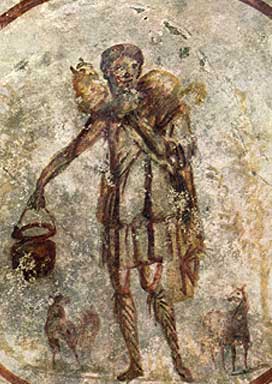History of Christian theology
History of Christian Theology refers to the study of the intellectual and philosophical developments of Christian beliefs and practices over two millennia. Christian theology has evolved through various historical contexts, encompassing a wide range of doctrines, rituals, and spiritual practices. This article outlines the major periods and influential figures in the development of Christian theology from the early church to the modern era.
Early Christian Theology[edit | edit source]
The roots of Christian theology can be traced back to the teachings of Jesus Christ and the writings of the New Testament. The Apostolic Fathers, including figures such as Ignatius of Antioch and Polycarp, were among the first to develop theological ideas, focusing on the nature of Christ, the Trinity, and the structure of the Church.
The Patristic Period[edit | edit source]
The Patristic Period (c. 100-451 AD) saw the development of foundational Christian doctrines in response to various heresies. Key figures such as Justin Martyr, Irenaeus, and Tertullian worked to define orthodoxy. The First Council of Nicaea (325 AD) and subsequent Ecumenical Councils were pivotal in establishing the doctrine of the Trinity and the nature of Christ.
Medieval Theology[edit | edit source]
During the Middle Ages, Christian theology became more systematized. The Scholasticism movement, with scholars such as Thomas Aquinas, Anselm of Canterbury, and Duns Scotus, sought to reconcile faith with reason, using the philosophy of Aristotle to explain Christian doctrine.
Reformation and Post-Reformation Theology[edit | edit source]
The Protestant Reformation (16th century) led by figures like Martin Luther, John Calvin, and Huldrych Zwingli challenged the authority of the Papacy and introduced new theological ideas, emphasizing justification by faith and the authority of the Scriptures. This period also saw the rise of Counter-Reformation within the Catholic Church, aiming to reform the church and reaffirm Catholic doctrines.
Modern Theology[edit | edit source]
The Enlightenment and the subsequent modern period brought new challenges to Christian theology, including rationalism, liberalism, and the historical-critical method. Theologians such as Friedrich Schleiermacher and Karl Barth responded with new approaches that emphasized personal faith and the sovereignty of God.
Contemporary Theology[edit | edit source]
In the contemporary period, Christian theology has become increasingly diverse, with a focus on issues such as liberation theology, feminist theology, and the dialogue between faith and science. Ecumenical movements seek to foster unity among different Christian denominations.
Conclusion[edit | edit source]
The history of Christian theology is a complex tapestry of thought, debate, and devotion. It reflects the dynamic and evolving nature of Christian faith as it interacts with different cultural, philosophical, and historical contexts.
Search WikiMD
Ad.Tired of being Overweight? Try W8MD's physician weight loss program.
Semaglutide (Ozempic / Wegovy and Tirzepatide (Mounjaro / Zepbound) available.
Advertise on WikiMD
|
WikiMD's Wellness Encyclopedia |
| Let Food Be Thy Medicine Medicine Thy Food - Hippocrates |
Translate this page: - East Asian
中文,
日本,
한국어,
South Asian
हिन्दी,
தமிழ்,
తెలుగు,
Urdu,
ಕನ್ನಡ,
Southeast Asian
Indonesian,
Vietnamese,
Thai,
မြန်မာဘာသာ,
বাংলা
European
español,
Deutsch,
français,
Greek,
português do Brasil,
polski,
română,
русский,
Nederlands,
norsk,
svenska,
suomi,
Italian
Middle Eastern & African
عربى,
Turkish,
Persian,
Hebrew,
Afrikaans,
isiZulu,
Kiswahili,
Other
Bulgarian,
Hungarian,
Czech,
Swedish,
മലയാളം,
मराठी,
ਪੰਜਾਬੀ,
ગુજરાતી,
Portuguese,
Ukrainian
Medical Disclaimer: WikiMD is not a substitute for professional medical advice. The information on WikiMD is provided as an information resource only, may be incorrect, outdated or misleading, and is not to be used or relied on for any diagnostic or treatment purposes. Please consult your health care provider before making any healthcare decisions or for guidance about a specific medical condition. WikiMD expressly disclaims responsibility, and shall have no liability, for any damages, loss, injury, or liability whatsoever suffered as a result of your reliance on the information contained in this site. By visiting this site you agree to the foregoing terms and conditions, which may from time to time be changed or supplemented by WikiMD. If you do not agree to the foregoing terms and conditions, you should not enter or use this site. See full disclaimer.
Credits:Most images are courtesy of Wikimedia commons, and templates, categories Wikipedia, licensed under CC BY SA or similar.
Contributors: Prab R. Tumpati, MD





